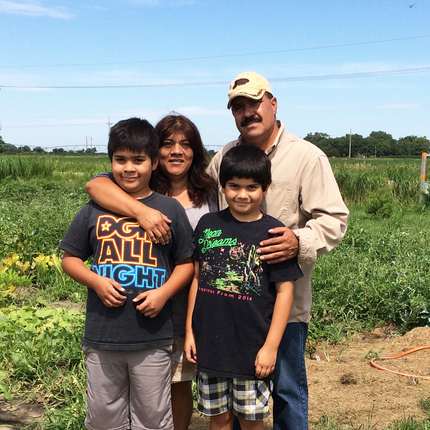By Lacie Dotterweich and Cora Fox, former staff members.
Hilda Moreno and Carlos Alvarado dream of setting their children up for success through opportunity. They want to show their sons that it is important to work hard – it’s not easy, but it’s worth it.
Hilda and Carlos, along with their two sons, are in their third year of farming. Their family farm is small, but mighty – they raise layer hens, registered meat goats, exotic pheasants, geese, peacocks, corn, tomatoes, and a variety of chili peppers, on five acres. In the future, they hope to start beekeeping, sell organic eggs at farmers markets, and acquire another five acres.
Carlos always knew he wanted to return to farming, as he grew up on a ranch. However, farming on their own proved to be more challenging than expected. Carlos and his family faced barriers such as access to land, access to credit, and no knowledge of where to go for help and resources.
Beginning Latino farmers face more obstacles than a non-Latino beginning farmer would. In general, the Latino community is not well-informed regarding resources offered by U.S. Department of Agriculture (USDA). For example, Hilda and Carlos were not aware of the Natural Resources Conservation Service (NRCS) and Farm Service Agency (FSA) offices before participating in the Latino Farmer Project. Additionally, many Latino farmers struggle to communicate with staff in these offices due to language barriers. While the USDA offers resources to Limited English Proficiency (LEP) farmers, bilingual staff are limited and not available in every office. This can be a challenge when trying to apply for a loan, or participate in a program.
Through the USDA’s Outreach Assistance to Socially-Disadvantaged Farmers and Ranchers Competitive Grants Program, otherwise known as the 2501 Program, Hilda and Carlos were able to get the help they needed. The Center for Rural Affairs was awarded $305,263 through the 2501 Program, which allowed staff to assist rural Nebraska Hispanic and Latino farmers and ranchers in accessing USDA programs. Thus, the Center’s Latino Farmer and Rancher Outreach Project was started.
The Latino Farmer and Rancher Outreach Project helped Hilda and Carlos access valuable resources as beginning farmers and ranchers. They now know where to go to get financing, and have qualified for loans to help them continue growing their successful farming operation. Through the Center’s project, they connected with more experienced farmers who mentored them. Today, Hilda and Carlos help others by hosting meetings, classes, and learning circles for fellow Latinos interested in farming and ranching.
The current farm bill expires on Sept. 30, 2018, and the 2501 Program is at risk of expiring right along with it. Despite increased demand to assist socially-disadvantaged and veteran farmers and ranchers, the program remains underfunded. To continue valuable work like the Latino Farmer and Rancher Outreach Project, it is important that Congress take action to reauthorize and provide additional funding for the 2501 Program.
Update: The Senate draft of the farm bill includes a proposal that would provide permanent funding to the 2501 program and the Beginning Farmer and Rancher Development Program. The bill proposes the combining of the two programs to create the Farming Opportunities Training and Outreach Program, which would better provide support to socially disadvantaged and beginning farmers and ranchers. We support this action and encourage representatives to include this in the final draft of the farm bill.





